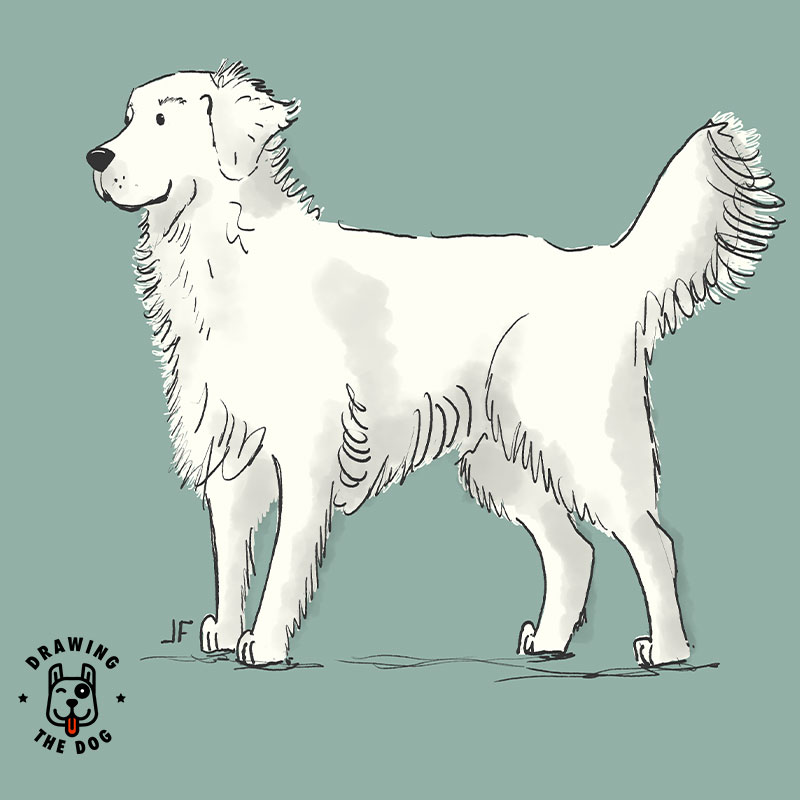Golden Retrievers 101 – A Guide To Goldens
Golden Retrievers 101:
A Guide To Goldens

Golden Retriever Dogs: Your Guide to Care, Training, and Art
Golden Retrievers are one of the most beloved dog breeds worldwide, known for their affectionate, loyal, and playful nature. Whether you’re a long-time Golden owner or considering bringing one into your life, this guide will walk you through everything you need to know about caring for and celebrating this amazing breed. And please check out our exclusive, hand-drawn Golden Retriever wall art.
Quick Facts: Golden Retriever Dogs
| Origin | Scotland, United Kingdom |
| Size | Medium to large (55–61 cm / 22–24 inches) |
| Weight | 27–36 kg (60–80 lbs) |
| Activity Level | High |
| Barking/Howling Level | Moderate |
| Good with Dogs | Yes |
| Good with Kids | Yes |
| Good with Cats | Yes, with early socialization |
| Shedding | High |
| Grooming Level | Moderate to High |
| Training Level | High; very intelligent and responsive |
History of Golden Retrievers
Golden Retrievers were developed in Scotland during the mid-19th century. They were bred specifically to retrieve waterfowl and game birds, excelling at bringing back birds in various terrains, including water. This history is central to the breed’s friendly and eager-to-please nature, as they were developed to work closely with humans. Golden Retrievers began making their way into the United States and Europe in the early 1900s and have since become one of the most popular family pets worldwide.
Characteristics of Golden Retrievers
Golden Retrievers are medium to large dogs with a muscular build. They have a dense, water-repellent double coat, often ranging in color from cream to golden. Their signature feature is their expressive, gentle eyes and friendly faces, which makes them instantly recognizable. Generally, males range from 55–61 cm (22–24 inches) in height and weigh between 30–36 kg (65–80 lbs), while females are slightly smaller at 51–56 cm (20–22 inches) and 27–32 kg (60–70 lbs).
Golden Retriever Temperament and Personality
Golden Retrievers are known for their cheerful and gentle disposition. These dogs are incredibly social, friendly, and deeply loyal to their families. They are also highly intelligent and easy to train, making them a great choice for families, singles, and seniors. Due to their loving nature, Golden Retrievers typically do well with children and other pets, creating harmony in multi-pet households.
Types of Golden Retrievers
There are three primary types of Golden Retrievers: the American, English, and Canadian varieties. Each type has slightly different physical characteristics:
- American Golden Retrievers: Known for their darker golden coats.
- English Golden Retrievers: Often have lighter, cream-coloured coats and are slightly stockier.
- Canadian Golden Retrievers: These typically have a thinner coat and leaner build.
Golden Retrievers as Family Dogs
One of the main reasons Golden Retrievers are popular as family pets is their easy-going and adaptable nature. They are especially great with children, often showing patience and tolerance. Their friendly disposition allows them to thrive in a family setting, whether it’s a house with a large garden or even a small apartment (provided they receive sufficient exercise).
Exercise Needs of Golden Retrievers
Golden Retrievers are high-energy dogs and require at least 1–2 hours of exercise daily to keep them healthy and happy. This breed thrives in activities that allow them to play, run, and swim. They also enjoy mentally stimulating activities such as puzzle toys, hide-and-seek games, and training sessions that engage their natural intelligence.
Grooming and Care for Golden Retrievers
Golden Retrievers have a dense, double-layered coat that requires regular grooming to keep it clean and healthy. Aim to brush your Golden Retriever’s coat at least 2–3 times a week to reduce shedding. Bathing should be done every month or so, while nail trimming, ear cleaning, and dental care should be part of a routine grooming schedule.
Health and Lifespan of Golden Retrievers
Golden Retrievers generally live for 10–12 years. They are prone to certain genetic health issues, including hip dysplasia, elbow dysplasia, and certain cancers. Regular vet visits are essential to monitor your dog’s health and catch any potential issues early.
Diet and Nutrition for Golden Retrievers
A balanced diet is crucial for Golden Retrievers. They require high-quality dog food rich in protein, fats, vitamins, and minerals. Avoid foods that contain fillers and artificial ingredients, as these can contribute to health problems over time. Additionally, Golden Retrievers are prone to obesity, so be mindful of portion sizes and limit treats.
Training and Socialization for Golden Retrievers
Golden Retrievers are one of the most trainable dog breeds, thanks to their intelligence and eagerness to please. Basic obedience training is essential and should start from puppyhood, including commands like “sit,” “stay,” and “come.” Socialization should also begin early, exposing your Golden to different environments, people, and animals to encourage a well-rounded temperament.
Golden Retriever Puppy Care
If you’re bringing home a Golden Retriever puppy, be prepared for lots of energy and curiosity. During the first year, puppies need gentle but consistent training and socialization. Make sure to provide chew toys and start basic training early to manage their natural enthusiasm and curiosity.
Living Environments for Goldens
Golden Retrievers are adaptable and can live comfortably in a range of environments, from spacious houses with large backyards to city apartments. However, if they live in a smaller space, they need daily outings for exercise and mental stimulation. A fenced yard is ideal for Goldens, as it allows them to run and play safely.
Golden Retrievers as Therapy and Service Dogs
Golden Retrievers are exceptional therapy and service dogs. Their natural empathy, calm demeanor, and intelligence make them well-suited for roles assisting people with disabilities. They also frequently work in hospitals, nursing homes, and schools as therapy dogs, providing comfort and companionship to those in need.
Golden Retriever Rescue and Adoption
If you’re considering adopting a Golden Retriever, check with local rescue organizations. Many Golden Retrievers are in need of a second chance and can make wonderful companions for individuals and families. Golden Retriever-specific rescue groups often provide resources, guidance, and post-adoption support to help you and your new dog adjust.
Art Prints of Golden Retrievers: Celebrate Your Love for Goldens
Golden Retrievers are truly beautiful dogs, and what better way to celebrate your love for this breed than with unique artwork? Whether you’re looking to decorate your home or find a thoughtful gift for a fellow dog lover, art prints featuring Golden Retrievers add a warm and personal touch. We offer a range of hand-drawn Golden Retriever-themed wall art, from realistic portraits to playful, whimsical designs that capture their joyful spirit. Visit our shop to discover art prints inspired by Golden Retrievers, perfect for brightening any space or gifting to the Golden enthusiast in your life. Click on the images below to see more of each Golden Retriever art piece.
Common Misconceptions about Golden Retrievers
Golden Retrievers are often stereotyped as being always gentle and low-maintenance. However, their high energy levels mean they need consistent exercise and mental stimulation to prevent boredom. Additionally, their shedding can be significant, making regular grooming a must.
Pros and Cons of Owning a Golden Retriever
Golden Retrievers bring a wealth of joy, but it’s essential to consider both the benefits and challenges:
- Pros: Friendly and great with families, highly trainable, excellent companions.
- Cons: High shedding, need for regular exercise, prone to certain health issues.
Frequently Asked Questions about Golden Retrievers
Are Golden Retrievers High Maintenance?
Golden Retrievers require moderate grooming and regular exercise, so they do need a bit of maintenance but are generally manageable with a good routine.
Are Golden Retrievers Good with Children?
Yes, Golden Retrievers are known for their friendly and patient nature, making them excellent companions for kids.
What Health Problems Do Golden Retrievers Have?
Goldens are prone to hip dysplasia, certain cancers, and other genetic conditions. Regular vet care is essential to monitor their health.
Do Golden Retrievers Bark a Lot?
Golden Retrievers bark to communicate but are not excessive barkers. Early training can help manage any nuisance barking.
Can Golden Retrievers Live with Cats?
Yes, with early socialization, Golden Retrievers can usually live harmoniously with cats.
Conclusion
Golden Retrievers bring immense joy, loyalty, and love to their families. From their playful nature to their keen intelligence, these dogs are truly exceptional companions. Whether you’re a Golden Retriever owner or considering adopting one, understanding their care needs and embracing their unique traits is key to enjoying a fulfilling life together. For more ways to celebrate your Golden, check out our art prints that capture the heart and charm of this incredible breed, adding a beautiful reminder of your bond to any space.
More Information:








